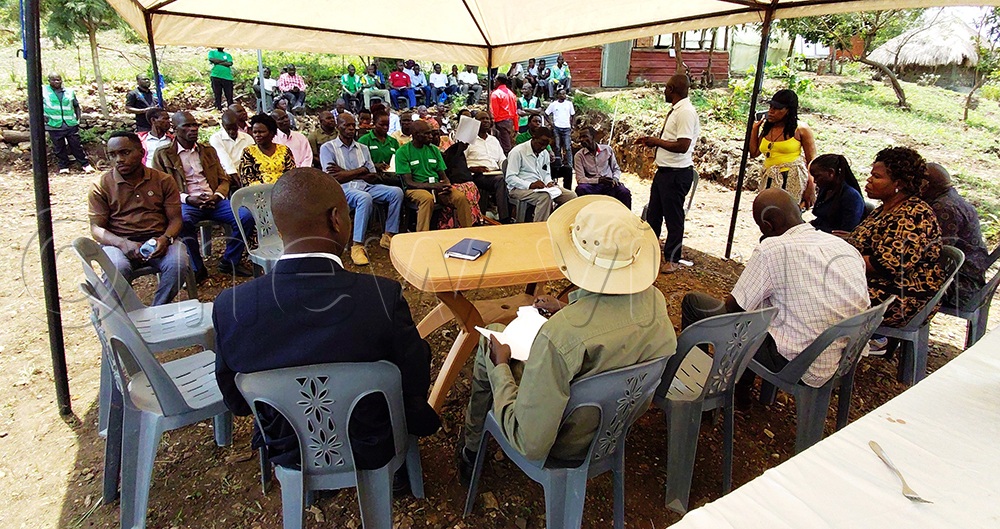Greater Nebbi agroecological farm to empower communities
The farm’s apiary produces organic honey, while its horticulture section thrives with fruits and vegetables. Tree seedlings here are not just crops—they’re tools for reforestation and climate resilience.
One of the workers feeding chicchickens at Mic Pa Mungu Agroecological Farm in Nebbi Municipality. (Credit: Robert Adiga)
NEBBI - The Mic Pa Mungu Agroecological Farm in Nebbi Municipality has become a symbol of sustainable agriculture, marking the first of its kind in Greater Nebbi.
Launched on Thursday, September 18, 2025, during the Green Action Week, this four-acre farm in Omoyo lower cell, Abindu ward, demonstrates how integrated farming can transform landscapes and lives.
Owned by Tony Opio since 2020, it blends ecological stewardship with economic empowerment, offering a blueprint for resilient, climate-smart agriculture.
Mic Pa Mungu is a mosaic of enterprises: Poultry, piggery, apiary, horticulture, tree seedling nurseries, fish ponds, and goat rearing. Each activity supports the next, minimising waste and maximising productivity.
The farm’s apiary produces organic honey, while its horticulture section thrives with fruits and vegetables. Tree seedlings here are not just crops—they’re tools for reforestation and climate resilience.
Agroecology in action
Agroecology, an approach that harmonises ecological principles with social equity, is central to the farm’s mission. As Tony Opio, the director, explained:
“Here, we practice climate-smart agriculture. All our enterprises work together to mitigate climate change. There’s no wastage—everything has a purpose.”
The farm’s success is bolstered by partnerships, including support from the Agency for Community Empowerment (AFCE), which has helped scale its impact.
Mindset change
Nebbi Resident District Commissioner Robert Abak hailed the farm as a model for the President’s “4-Acre Model,” emphasising that small-scale, diversified farming can thrive without vast land:
“Mic Pa Mungu proves you don’t need 1,000 acres. With agroecology, even a small plot can yield eight enterprises and protect the environment. This is what agriculture should be—a business built on innovation.”
Agricultural Officer Joice Piwa echoed this, praising the farm’s transformation of a once-hilly, rocky area into a hub of productivity:
“Our people aren’t poor—they lack mindset change. Mic Pa Mungu shows us how to turn barren land into wealth while preserving indigenous seeds and trees. This is organic farming at its finest.”
Building resilience
The farm’s doors are open to learners. James Pewona of Facilitation for Peace and Development (FAPAD) noted how farmers from Amolatar District had come to benchmark its practices:
“The use of indigenous species here is revolutionary. It’s not just farming—it’s a lesson in ecological balance.”
Moses Onen of Participatory Ecological Land Use Management (PELUM) Uganda highlighted the farm’s role in promoting agroecological technologies:
“Centres like Mic Pa Mungu are vital for demonstrating sustainable practices. They turn theory into action, proving that climate resilience and profit can coexist.”
Beyond profits, the farm prioritises community empowerment. It offers training, employs locals and fosters food security through diversified production. Opio reaffirmed its mission:
“We’re here to inspire a new generation of farmers. Agroecology isn’t just farming—it’s a movement toward healthier ecosystems and thriving communities.”